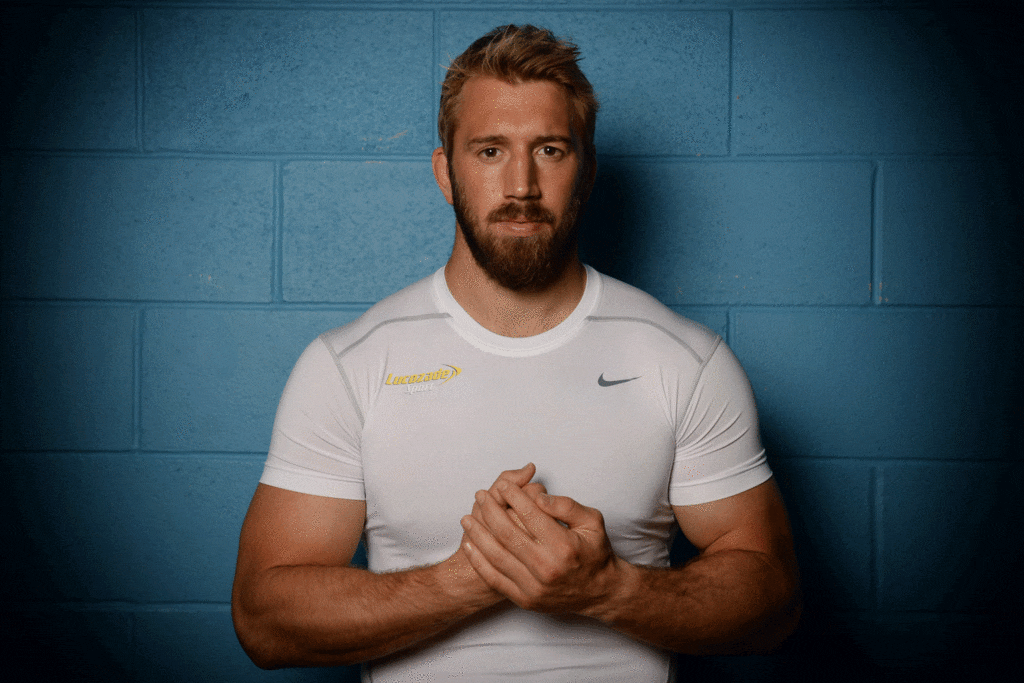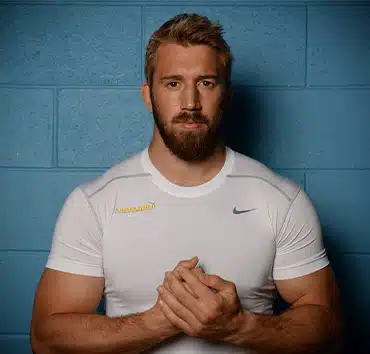Facts about Chris Robshaw
England Captaincy
Chris Robshaw first captained the England national rugby team in 2012 and led the team through 43 appearances as captain until 2015.
Post-Rugby Career
After retiring from professional rugby in 2022, Robshaw has transitioned into the business world, working part-time for Gallagher, a global insurance brokerage, and serving as the Director of the Sports and Entertainment Division at Vin-X Fine Wine Investment.
Personal Triumphs
Despite facing significant personal challenges, such as losing his father at age five and struggling with dyslexia, Robshaw has achieved remarkable success both on and off the rugby field, including his entrepreneurial ventures and charitable work.


Chris Robshaw
Chris Robshaw is a former rugby union player most famous for captaining the England national team from 2012 to 2015. Known for his hard work and leadership, he played in the back row, primarily as a flanker, and is considered one of the greats of the game. Robshaw's professional career began with Harlequins in 2005, where he played until 2020, captaining the team to a Premiership title in 2012. He earned 66 caps for England, all starts, and captained the team in 43 of those appearances. Post his Harlequins career, Robshaw played for San Diego Legion in Major League Rugby from 2021 to 2022, retiring on October 21, 2022. Beyond the field, Robshaw has become a successful entrepreneur, launching his own corporate events company and co-owning ventures like Josie's Coffee Shop. He is also a board member for Dress 2 Kill Ltd and co-owner of Zeus Events. Active in charity work, he supports organizations like the NSPCC and Teenage Cancer Trust and has established the Kerslake Robshaw Foundation to help disadvantaged youth through music and sport. Currently, Robshaw works part-time for Gallagher, a global insurance brokerage and risk management firm, and serves as the Director of the Sports and Entertainment Division at Vin-X Fine Wine Investment.
Q&a
How did you learn leadership and become a captain, especially at the age of 23? Working with other captains helped, but given your youth and inexperience, did you have support or mentors? Did you read any books on leadership?
Yeah, all of the above, really. I love reading books and autobiographies, and I enjoy picking people’s brains. But I like to take it a step further. I learn a lot from people who have been in the arena, witnessed success and failure, and come back from it. For me, this meant speaking to former international captains like Tony Adams, Alastair Cook, and Kevin Sinfield. I remember once trying out advice I received, only to be laughed out of the room by my team. The rugby environment can be unforgiving, but I tried something else that resonated with the players. You have to learn and evolve, but it’s crucial to do it in your own style.
What lessons have you learned from playing rugby that you find applicable to business? Do you see any parallels between sports and business?
It’s really interesting. I believe in continually surrounding yourself with people who know more than you and learning from various industries. When I was a captain, I made it a point to talk to leaders in different sports because there are both parallels and differences that can be incredibly insightful. In the corporate world, things tend to move more slowly compared to the fast-paced nature of sports, where mistakes need to be rectified immediately. Adopting a mindset that encourages quicker decision-making and learning from diverse leaders can help speed up processes and drive success in business.
In interviews with senior executives, many express frustration that their ideas take too long to implement and feel their contributions lack impact. I pitch that one benefit of joining our company is the lack of hierarchy, allowing good ideas to be executed quickly. Even with regulatory concerns, we aim for swift implementation. Do you apply this principle of speedy execution in your own businesses?
Yeah, it’s similar in our world, especially in rugby, which I initially struggled with. There’s this concept from rowing about making the boat go faster, regardless of whose idea it is. As a young captain, I used to think it had to be my idea, but that’s not always the case. Some leaders feel threatened by ideas from others, fearing they might be overshadowed. But fostering a culture where everyone supports each other leads to real success. Culture plays a significant role, and in environments with a positive culture, success tends to follow.
How would you advise someone on creating a positive culture, based on your experience in leading teams? And what advice would you give to a new business owner struggling with growth and culture development?
I believe honesty is crucial, but it’s equally important to consider how we deliver feedback. For instance, criticising someone openly in front of others can be detrimental, whereas a private conversation might be more constructive. Effective team and people management are essential for fostering improvement. Over time, I’ve learned to understand and adapt to individual personalities rather than treating everyone the same. This flexibility is key, especially in environments where people come from diverse backgrounds and experiences. Encouraging personal development, even if it means investing in courses or training, can greatly benefit both the individual and the company. Embracing change and being open to new ideas is vital for growth and success.
You mentioned the concept of “carrot and stick,” and I’m all for the “carrot” approach, meaning rewards and incentives, rather than the “stick,” which involves punishment. However, there needs to be a balance. Offering too many rewards can sometimes lead to issues, especially in today’s culture where excessive leniency may be perceived as “woke.” Have you noticed this trend in rugby? Is there an element of “wokeness” in the sport?
Certainly, there are differences between sports and business environments. In sports, you have the ability to impose physical challenges as a form of discipline, such as extra fitness training. However, this approach doesn’t quite translate to the office setting. I can’t imagine doing shuttle runs in the car park during lunch break! Perhaps that’s where the line is drawn.
Yet, despite these differences, there’s a fundamental similarity: the importance of trust and respect among team members. In sports, forming strong bonds is crucial because you spend so much time together and need to trust each other on the field. Similarly, in the workplace, while you may not always like everyone, mutual respect and trust are essential for effective collaboration. Respect isn’t given freely; it must be earned through consistent actions and behaviours.
As you look into the future, what are your aspirations for the next five, ten, or fifteen years?
I find myself at a point where everyone used to ask, “What’s next?” Now, it’s more about where we’ll be in five years. Honestly, I still don’t have a clear answer, and I’m not sure if anyone truly does.
It’s interesting how when someone like yourself is asked about future plans, it feels like sportspeople are almost 20 years behind everyone else. Typically, such questions are directed at those in their early twenties or just out of university. It’s as if you’ve spent the last 20 years dedicated to a parallel activity, and now you’re starting anew from ground zero. Have you ever felt this way about your career trajectory in sports?
Here’s how I put it to people: while others might bounce around between jobs for a couple of years after university, for us in sports, it’s happening 15 to 20 years later, often with mortgages and kids in the picture. From a foundational standpoint, my goal is to raise £1 million over the next decade for various causes. On the personal and business front, I’m still figuring things out. Family-wise, I’ve learned to cherish every moment, especially after losing my father. Being there for my family is a top priority. As for playing rugby, I’m undecided. I want to be active with my children, but we’ll see how things unfold.
In terms of career satisfaction, I’ve spoken to players further along than me, and it seems to take about seven years for them to feel truly fulfilled. So, hopefully, in five or ten years, I’ll have a clearer sense of where I stand.
Can you share your quick thoughts on the current state of England rugby? I believe they lost to France a few weeks ago, around July 6th. How are they performing overall? What steps can they take to improve, and what are their future goals?
It’s really interesting because England recently competed in the World Cup, and many felt their play wasn’t outstanding. They had a slow start in the 2024 Six Nations, but their last two games were spectacular. They might have beaten Ireland at Twickenham, creating an atmosphere not seen in a long time. Their tries were amazing, and their defense was intense. They also played brilliantly in France, losing by just one point in the final moments.
Overall, I think England rugby is in a good place. They’re touring Japan and New Zealand this summer, which will be a tough challenge since they’ve never won a series there. The young, fearless squad will relish the opportunity. The Premiership is thriving, with exciting games, sold-out crowds, and a post-COVID resurgence.
Additionally, the Netflix documentary on rugby is helping to boost the sport’s popularity, much like “Drive to Survive” did for Formula 1. Overall, rugby in England is getting back on track.
